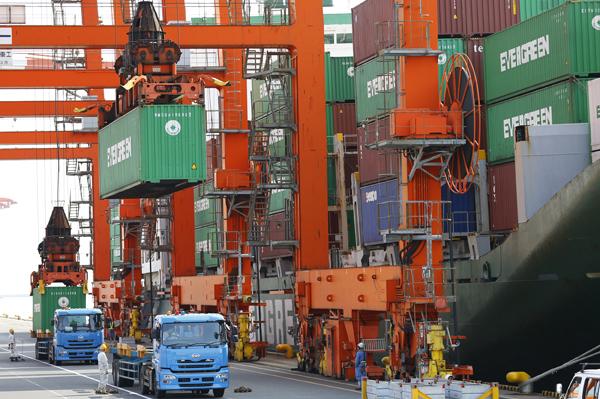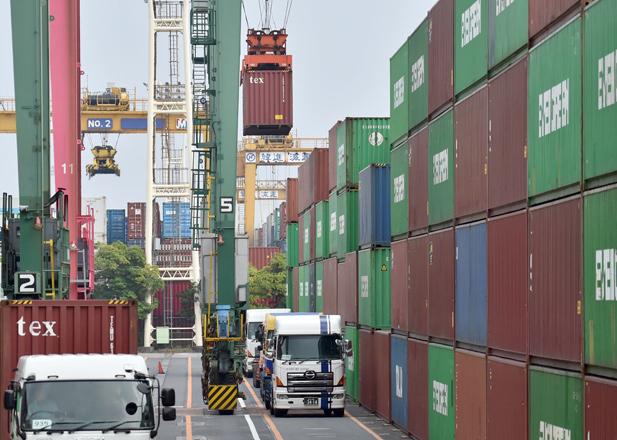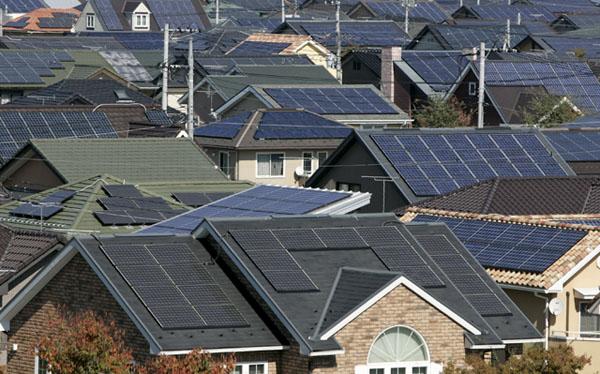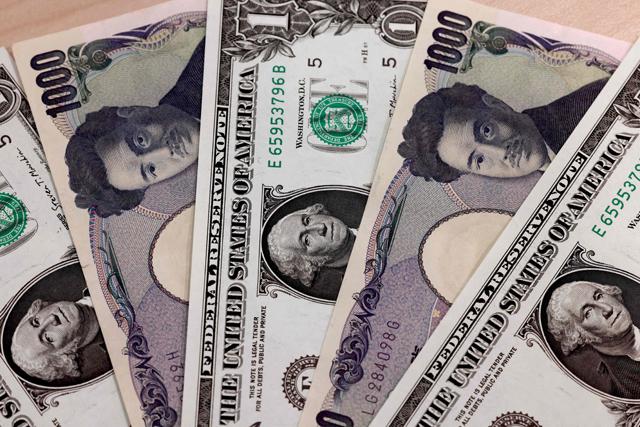You are here
Japan's 2015 trade deficit narrows on oil price tumble
By AFP - Jan 25,2016 - Last updated at Jan 25,2016

In this October 21, 2015, file photo, workers watch shipping and discharging of containers at a port in Tokyo (AP photo)
TOKYO — Japan's trade deficit narrowed sharply in 2015 as tumbling oil prices took pressure off its soaring post-Fukushima energy import bill, official data showed Monday, while autos led a pick-up in exports.
The deficit decline offered up some good news for Prime Minister Shinzo Abe as he struggles to stoke growth and ahead of a test to his leadership in upper house elections this summer.
Stronger demand in some key markets, including the United States, and a sharply weaker yen boosted exports from the world's number three economy, the finance ministry indicated.
The figures showed Japan recorded its fifth-straight annual trade deficit, but the latest figure narrowed by 78 per cent from 2014 to 2.83 trillion yen ($23.8 billion).
Auto exports surged 10.3 per cent from a year ago, while the value of crude oil imports dropped 41 per cent.
For December alone, the nation saw a trade surplus of 140 billion yen, returning to the black for the first time in two months.
Japan remains highly dependent on energy imports to power the economy, but a big drop in oil prices over the summer has taken pressure off the cost of its energy needs.
The nation has kept most of its nuclear reactors closed since a tsunami and earthquake triggered meltdowns at the Fukushima plant in 2011.
The accident forced Japan to turn to pricey imported fossil fuels to keep the lights on, leading to a string of big trade deficits.
"The continued weakening in energy prices is exacerbating the fall in import prices," said Marcel Thieliant at research house Capital Economics.
Abe has pushed to restart nuclear plants, backed by Japan's business community, but the public is sharply divided with many opposed to returning to atomic power.
'Energy question'
Several reactors have been restarted since the worst atomic accident in a generation.
"The resumption of nuclear power plants had only a very marginal impact on the 2015 trade statistics," said Junko Nishioka, chief economist at Sumitomo Mitsui Banking.
"But if the Abe administration moves forward [on more restarts] in the near term, it would have...further impact towards reducing the trade deficit," he added.
But Nishioka warned that overseas demand, particularly in China, was at risk in the face of a struggling global economy.
"Given the market turmoil, it will likely dampen business confidence," Nishioka said.
Falling oil prices have also depressed oil-related investment in the United States, denting demand for Japanese construction machinery, said Junichi Makino, chief economist at SMBC Nikko Securities.
"Looking forward, automobile demand is expected to stay solid, while a pickup is expected for electronics," Makino added. "But a downside risk remains with general machinery."
The trade figures come as economists look to next month's release of gross domestic product figures for the final quarter of 2015.
Revised data showed Japan's economy grew a stronger-than-expected 0.3 per cent in the July-September period, after initial estimates had showed a contraction.
Japan's economy fell into a brief recession in 2014 after consumers tightened their belts as Tokyo hiked the country's consumption tax to help pay down a massive national debt.
That downturn spurred the Bank of Japan to sharply increase its massive asset-buying programme, a cornerstone of Abenomics, effectively printing money to spur lending.
The bank holds a meeting this week with speculation rising that policymakers may unleash another round of easing to counter weakness in the economy.
Related Articles
TOKYO — Japan's politically sensitive trade surplus with the United States grew more than 15 per cent in July, data showed on Monday, as neg
One by one, Japan is turning off the lights at the giant oil-fired power plants that propelled it to the ranks of the world's top industrialised nations. With nuclear power in the doldrums after the Fukushima disaster, it's solar energy that is becoming the alternative.
TOKYO — The yen hit its lowest level against the dollar in two decades on Wednesday, extending recent falls as the gap widens between Japan'

















